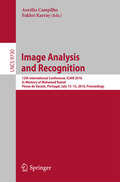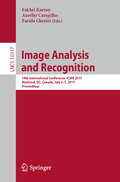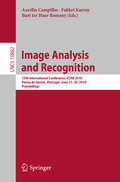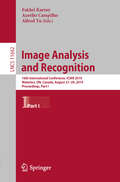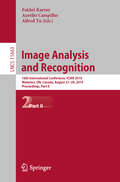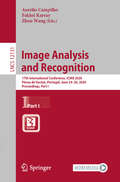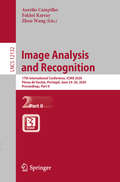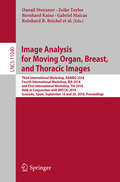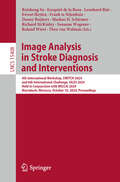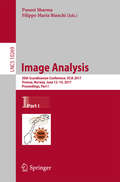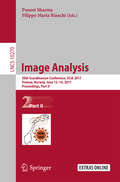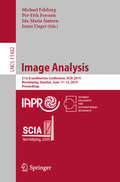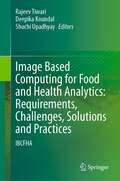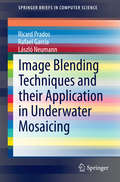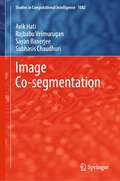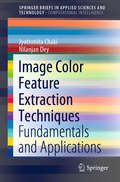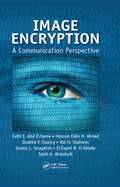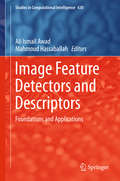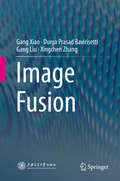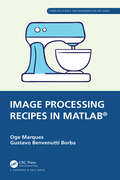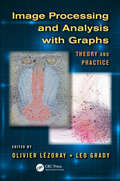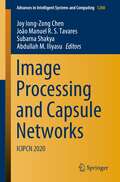- Table View
- List View
Image Analysis and Recognition
by Aurélio Campilho Fakhri KarrayThis book constitutes the thoroughly refereed proceedings of the 13th International Conference on Image Analysis and Recognition, ICIAR 2016, held in Povoa de Varzim, Portugal, in July 2016. The 79 revised full papers and 10 short papers presented were carefully reviewed and selected from 167 submissions. The papers are organized in the following topical sections: Advances in Data Analytics and Pattern Recognition with Applications, Image Enhancement and Restoration, Image Quality Assessment, Image Segmentation, Pattern Analysis and Recognition, Feature Extraction, Detection and Recognition, Matching, Motion and Tracking, 3D Computer Vision, RGB-D Camera Applications, Visual Perception in Robotics, Biometrics, Biomedical Imaging, Brain Imaging, Cardiovascular Image Analysis, Image Analysis in Ophthalmology, Document Analysis, Applications, and Obituaries. "
Image Analysis and Recognition: 14th International Conference, ICIAR 2017, Montreal, QC, Canada, July 5–7, 2017, Proceedings (Lecture Notes in Computer Science #10317)
by Aurélio Campilho Fakhri Karray Farida CherietThis book constitutes the thoroughly refereed proceedings of the 14th International Conference on Image Analysis and Recognition, ICIAR 2017, held in Montreal, QC, Canada, in July 2017. The 73 revised full papers presented were carefully reviewed and selected from 133 submissions. The papers are organized in the following topical sections: machine learning in image recognition; machine learning for medical image computing; image enhancement and reconstruction; image segmentation; motion and tracking; 3D computer vision; feature extraction; detection and classification; biomedical image analysis; image analysis in ophthalmology; remote sensing; applications.
Image Analysis and Recognition: 15th International Conference, ICIAR 2018, Póvoa de Varzim, Portugal, June 27–29, 2018, Proceedings (Lecture Notes in Computer Science #10882)
by Aurélio Campilho Fakhri Karray Bart ter Haar RomenyThis book constitutes the thoroughly refereed proceedings of the 15th International Conference on Image Analysis and Recognition, ICIAR 2018, held in Póvoa de Varzim, Portugal, in June 2018.The 91 full papers presented together with 15 short papers were carefully reviewed and selected from 179 submissions. The papers are organized in the following topical sections: Enhancement, Restoration and Reconstruction, Image Segmentation, Detection, Classication and Recognition, Indexing and Retrieval, Computer Vision, Activity Recognition, Traffic and Surveillance, Applications, Biomedical Image Analysis, Diagnosis and Screening of Ophthalmic Diseases, and Challenge on Breast Cancer Histology Images.
Image Analysis and Recognition: 16th International Conference, ICIAR 2019, Waterloo, ON, Canada, August 27–29, 2019, Proceedings, Part I (Lecture Notes in Computer Science #11662)
by Aurélio Campilho Fakhri Karray Alfred YuThis two-volume set LNCS 11662 and 11663 constitutes the refereed proceedings of the 16th International Conference on Image Analysis and Recognition, ICIAR 2019, held in Waterloo, ON, Canada, in August 2019. The 58 full papers presented together with 24 short and 2 poster papers were carefully reviewed and selected from 142 submissions. The papers are organized in the following topical sections: Image Processing; Image Analysis; Signal Processing Techniques for Ultrasound Tissue Characterization and Imaging in Complex Biological Media; Advances in Deep Learning; Deep Learning on the Edge; Recognition; Applications; Medical Imaging and Analysis Using Deep Learning and Machine Intelligence; Image Analysis and Recognition for Automotive Industry; Adaptive Methods for Ultrasound Beamforming and Motion Estimation.
Image Analysis and Recognition: 16th International Conference, ICIAR 2019, Waterloo, ON, Canada, August 27–29, 2019, Proceedings, Part II (Lecture Notes in Computer Science #11663)
by Aurélio Campilho Fakhri Karray Alfred YuThis two-volume set LNCS 11662 and 11663 constitutes the refereed proceedings of the 16th International Conference on Image Analysis and Recognition, ICIAR 2019, held in Waterloo, ON, Canada, in August 2019. The 58 full papers presented together with 24 short and 2 poster papers were carefully reviewed and selected from 142 submissions. The papers are organized in the following topical sections: Image Processing; Image Analysis; Signal Processing Techniques for Ultrasound Tissue Characterization and Imaging in Complex Biological Media; Advances in Deep Learning; Deep Learning on the Edge; Recognition; Applications; Medical Imaging and Analysis Using Deep Learning and Machine Intelligence; Image Analysis and Recognition for Automotive Industry; Adaptive Methods for Ultrasound Beamforming and Motion Estimation.
Image Analysis and Recognition: 17th International Conference, ICIAR 2020, Póvoa de Varzim, Portugal, June 24–26, 2020, Proceedings, Part I (Lecture Notes in Computer Science #12131)
by Zhou Wang Aurélio Campilho Fakhri KarrayThis two-volume set LNCS 12131 and LNCS 12132 constitutes the refereed proceedings of the 17th International Conference on Image Analysis and Recognition, ICIAR 2020, held in Póvoa de Varzim, Portugal, in June 2020.The 54 full papers presented together with 15 short papers were carefully reviewed and selected from 123 submissions. The papers are organized in the following topical sections: image processing and analysis; video analysis; computer vision; 3D computer vision; machine learning; medical image and analysis; analysis of histopathology images; diagnosis and screening of ophthalmic diseases; and grand challenge on automatic lung cancer patient management.Due to the corona pandemic, ICIAR 2020 was held virtually only.
Image Analysis and Recognition: 17th International Conference, ICIAR 2020, Póvoa de Varzim, Portugal, June 24–26, 2020, Proceedings, Part II (Lecture Notes in Computer Science #12132)
by Zhou Wang Aurélio Campilho Fakhri KarrayThis two-volume set LNCS 12131 and LNCS 12132 constitutes the refereed proceedings of the 17th International Conference on Image Analysis and Recognition, ICIAR 2020, held in Póvoa de Varzim, Portugal, in June 2020.The 54 full papers presented together with 15 short papers were carefully reviewed and selected from 123 submissions. The papers are organized in the following topical sections: image processing and analysis; video analysis; computer vision; 3D computer vision; machine learning; medical image and analysis; analysis of histopathology images; diagnosis and screening of ophthalmic diseases; and grand challenge on automatic lung cancer patient management.Due to the corona pandemic, ICIAR 2020 was held virtually only.
Image Analysis for Moving Organ, Breast, and Thoracic Images: Third International Workshop, RAMBO 2018, Fourth International Workshop, BIA 2018, and First International Workshop, TIA 2018, Held in Conjunction with MICCAI 2018, Granada, Spain, September 16 and 20, 2018, Proceedings (Lecture Notes in Computer Science #11040)
by Andrew P. Bradley Jens Petersen Kensaku Mori Gustavo Carneiro Kanwal Bhatia Bernhard Kainz Lena Maier-Hein Tom Vercauteren Danail Stoyanov Zeike Taylor Anne Martel Gabriel Maicas Reinhard R. Beichel Ozan Oktay Jacinto Nascimento Hang Min Matthew S. Brown Colin Jacobs Bianca Lassen-Schmidt Raúl San José Estépar Alexander Schmidt-Richberg Catarina VeigaThis book constitutes the refereed joint proceedings of the Third International Workshop on Reconstruction and Analysis of Moving Body Organs, RAMBO 2018, the Fourth International Workshop on Breast Image Analysis, BIA 2018, and the First International Workshop on Thoracic Image Analysis, TIA 2018, held in conjunction with the 21st International Conference on Medical Imaging and Computer-Assisted Intervention, MICCAI 2018, in Granada, Spain, in September 2018. The 5 full papers (out of 10 submissions) presented at RAMBO, the 9 full papers (out of 18 submissions) presented at BIA, and the 20 full papers (out of 21 submissions) presented at TIA were carefully reviewed and selected. The RAMBO papers cover aspects of medical imaging where motion plays a role in the image formation or analysis. The BIA papers deal with topics such as computer-aided detection and diagnosis of breast cancer, quantitative analysis of breast imaging modalities, and large scale breast image screening and analysis. The TIA papers cover aspects of image analysis research for lung and cardiac diseases including segmentation, registration, quantification, modeling of the image acquisition process, visualization, validation, statistical modeling, biophysical lung modeling (computational anatomy), deep learning and novel applications.
Image Analysis in Stroke Diagnosis and Interventions: 4th International Workshop, SWITCH 2024, and 6th International Challenge, ISLES 2024, Held in Conjunction with MICCAI 2024, Marrakesh, Morocco, October 10, 2024, Proceedings (Lecture Notes in Computer Science #15408)
by Theo van Walsum Roland Wiest Markus D. Schirmer Ruisheng Su Ezequiel de la Rosa Leonhard Rist Ewout Heylen Frank Te Nijenhuis Danny Ruijters Richard McKinley Susanne WegenerThis book constitutes the refereed proceedings of the 4th International MICCAI Stroke Workshop on Imaging and Treatment Challenges, SWITCH 2024, as well as the Ischemic Stroke Lesion Segmentation Challenge, ISLES 2024, held in conjunction with MICCAI 2024, in Marrakesh, Morocco, on October 10, 2024. The 12 revised full papers presented in this volume were selected form 16 submissions. The papers describe research advancements in image analysis for the diagnosis and intervention of ischemic and haemorrhagic stroke and present the latest developments in segmentation, disease prognosis, stroke diagnosis and treatment, and other clinically relevant applications.
Image Analysis: 20th Scandinavian Conference, SCIA 2017, Tromsø, Norway, June 12–14, 2017, Proceedings, Part I (Lecture Notes in Computer Science #10269)
by Puneet Sharma and Filippo Maria BianchiThe two-volume set LNCS 10269 and 10270 constitutes the refereed proceedings of the 20th Scandinavian Conference on Image Analysis, SCIA 2017, held in Tromsø, Norway, in June 2017. The 87 revised papers presented were carefully reviewed and selected from 133 submissions. The contributions are structured in topical sections on history of SCIA; motion analysis and 3D vision; pattern detection and recognition; machine learning; image processing and applications; feature extraction and segmentation; remote sensing; medical and biomedical image analysis; faces, gestures and multispectral analysis.
Image Analysis: 20th Scandinavian Conference, SCIA 2017, Tromsø, Norway, June 12–14, 2017, Proceedings, Part II (Lecture Notes in Computer Science #10270)
by Puneet Sharma and Filippo Maria BianchiThe two-volume set LNCS 10269 and 10270 constitutes the refereed proceedings of the 20th Scandinavian Conference on Image Analysis, SCIA 2017, held in Tromsø, Norway, in June 2017. The 87 revised papers presented were carefully reviewed and selected from 133 submissions. The contributions are structured in topical sections on history of SCIA; motion analysis and 3D vision; pattern detection and recognition; machine learning; image processing and applications; feature extraction and segmentation; remote sensing; medical and biomedical image analysis; faces, gestures and multispectral analysis.
Image Analysis: 21st Scandinavian Conference, SCIA 2019, Norrköping, Sweden, June 11–13, 2019, Proceedings (Lecture Notes in Computer Science #11482)
by Michael Felsberg Per-Erik Forssén Ida-Maria Sintorn Jonas UngerThis volume constitutes the refereed proceedings of the 21st Scandinavian Conference on Image Analysis, SCIA 2019, held in Norrköping, Sweden, in June 2019. The 40 revised papers presented were carefully reviewed and selected from 63 submissions. The contributions are structured in topical sections on Deep convolutional neural networks; Feature extraction and image analysis; Matching, tracking and geometry; and Medical and biomedical image analysis.
Image Based Computing for Food and Health Analytics: IBCFHA
by Rajeev Tiwari Deepika Koundal Shuchi UpadhyayIncrease in consumer awareness of nutritional habits has placed automatic food analysis in the spotlight in recent years. However, food-logging is cumbersome and requires sufficient knowledge of the food item consumed. Additionally, keeping track of every meal can become a tedious task. Accurately documenting dietary caloric intake is crucial to manage weight loss, but also presents challenges because most of the current methods for dietary assessment must rely on memory to recall foods eaten. Food understanding from digital media has become a challenge with important applications in many different domains. Substantial research has demonstrated that digital imaging accurately estimates dietary intake in many environments and it has many advantages over other methods. However, how to derive the food information effectively and efficiently remains a challenging and open research problem. The provided recommendations could be based on calorie counting, healthy food and specific nutritional composition. In addition, if we also consider a system able to log the food consumed by every individual along time, it could provide health-related recommendations in the long-term. Computer Vision specialists have developed new methods for automatic food intake monitoring and food logging. Fourth Industrial Revolution [4.0 IR] technologies such as deep learning and computer vision robotics are key for sustainable food understanding. The need for AI based technologies that allow tracking of physical activities and nutrition habits are rapidly increasing and automatic analysis of food images plays an important role. Computer vision and image processing offers truly impressive advances to various applications like food analytics and healthcare analytics and can aid patients in keeping track of their calorie count easily by automating the calorie counting process. It can inform the user about the number of calories, proteins, carbohydrates, and other nutrients provided by each meal. The information is provided in real-time and thus proves to be an efficient method of nutrition tracking and can be shared with the dietician over the internet, reducing healthcare costs. This is possible by a system made up of, IoT sensors, Cloud-Fog based servers and mobile applications. These systems can generate data or images which can be analyzed using machine learning algorithms. Image Based Computing for Food and Health Analytics covers the current status of food image analysis and presents computer vision and image processing based solutions to enhance and improve the accuracy of current measurements of dietary intake. Many solutions are presented to improve the accuracy of assessment by analyzing health images, data and food industry based images captured by mobile devices. Key technique innovations based on Artificial Intelligence and deep learning-based food image recognition algorithms are also discussed. This book examines the usage of 4.0 industrial revolution technologies such as computer vision and artificial intelligence in the field of healthcare and food industry, providing a comprehensive understanding of computer vision and intelligence methodologies which tackles the main challenges of food and health processing. Additionally, the text focuses on the employing sustainable 4 IR technologies through which consumers can attain the necessary diet and nutrients and can actively monitor their health. In focusing specifically on the food industry and healthcare analytics, it serves as a single source for multidisciplinary information involving AI and vision techniques in the food and health sector. Current advances such as Industry 4.0 and Fog-Cloud based solutions are covered in full, offering readers a fully rounded view of these rapidly advancing health and food analysis systems.
Image Blending Techniques and their Application in Underwater Mosaicing
by Ricard Prados Rafael Garcia László NeumannThis work proposes strategies and solutions to tackle the problem of building photo-mosaics of very large underwater optical surveys, presenting contributions to the image preprocessing, enhancing and blending steps, and resulting in an improved visual quality of the final photo-mosaic. The text opens with a comprehensive review of mosaicing and blending techniques, before proposing an approach for large scale underwater image mosaicing and blending. In the image preprocessing step, a depth dependent illumination compensation function is used to solve the non-uniform illumination appearance due to light attenuation. For image enhancement, the image contrast variability due to different acquisition altitudes is compensated using an adaptive contrast enhancement based on an image quality reference selected through a total variation criterion. In the blending step, a graph-cut strategy operating in the image gradient domain over the overlapping regions is suggested. Next, an out-of-core blending strategy for very large scale photo-mosaics is presented and tested on real data. Finally, the performance of the approach is evaluated and compared with other approaches.
Image Co-segmentation (Studies in Computational Intelligence #1082)
by Subhasis Chaudhuri Rajbabu Velmurugan Avik Hati Sayan BanerjeeThis book presents and analyzes methods to perform image co-segmentation. In this book, the authors describe efficient solutions to this problem ensuring robustness and accuracy, and provide theoretical analysis for the same. Six different methods for image co-segmentation are presented. These methods use concepts from statistical mode detection, subgraph matching, latent class graph, region growing, graph CNN, conditional encoder–decoder network, meta-learning, conditional variational encoder–decoder, and attention mechanisms. The authors have included several block diagrams and illustrative examples for the ease of readers. This book is a highly useful resource to researchers and academicians not only in the specific area of image co-segmentation but also in related areas of image processing, graph neural networks, statistical learning, and few-shot learning.
Image Color Feature Extraction Techniques: Fundamentals and Applications (SpringerBriefs in Applied Sciences and Technology)
by Nilanjan Dey Jyotismita ChakiThis book introduces a range of image color feature extraction techniques. Readers are encouraged to try implementing the techniques discussed here on their own, all of which are presented in a very simple and step-by-step manner. In addition, the book can be used as an introduction to image color feature techniques for those who are new to the research field and software. The techniques are very easy to understand as most of them are described with pictorial examples. Not only the techniques themselves, but also their applications are covered. Accordingly, the book offers a valuable guide to these tools, which are a vital component of content-based image retrieval (CBIR).
Image Content Retargeting: Maintaining Color, Tone, and Spatial Consistency
by Alessandro Artusi Francesco Banterle Tunç Ozan Aydın Daniele Panozzo Olga Sorkine-HornungIn recent years visual devices have proliferated, from the massive high-resolution, high-contrast screens to the tiny ones on mobile phones, with their limited dynamic range and color gamut. The wide variety of screens on which content may be viewed creates a challenge for developers. Adapting visual content for optimized viewing on all devices is called retargeting. This is the first book to provide a holistic view of the subject, thoroughly reviewing and analyzing the many techniques that have been developed for retargeting along dimensions such as color gamut, dynamic range, and spatial resolution.
Image Copy-Move Forgery Detection: New Tools and Techniques (Studies in Computational Intelligence #1017)
by Badal Soni Pradip K. DasThis book presents a detailed study of key points and block-based copy-move forgery detection techniques with a critical discussion about their pros and cons. It also highlights the directions for further development in image forgery detection. The book includes various publicly available standard image copy-move forgery datasets that are experimentally analyzed and presented with complete descriptions. Five different image copy-move forgery detection techniques are implemented to overcome the limitations of existing copy-move forgery detection techniques. The key focus of work is to reduce the computational time without adversely affecting the efficiency of these techniques. In addition, these techniques are also robust to geometric transformation attacks like rotation, scaling, or both.
Image Encryption: A Communication Perspective
by Osama S. Faragallah El-Sayed M. El-Rabaie Fathi E. Abd El-Samie Hossam Eldin Ahmed Ibrahim F. Elashry Mai H. Shahieen Saleh A. AlshebeiliInvestigating image encryption approaches, this book examines image encryption algorithms for the purpose of wireless communication of images in secure form. It considers two directions for image encryption: permutation-based encryption and diffusion-based encryption. Covering the range of image encryption principles and techniques, it presents hybrid encryption algorithms to enhance the characteristics of traditional algorithms. It explores number theory-based encryption algorithms, details the strength of different encryption algorithms, and describes their ability to work within the limitations of wireless communication systems.
Image Feature Detectors and Descriptors
by Ali Ismail Awad Mahmoud HassaballahThis bookprovides readers with a selection of high-quality chapters that cover boththeoretical concepts and practical applications of image feature detectors anddescriptors. It serves as reference for researchers and practitioners byfeaturing survey chapters and research contributions on image feature detectorsand descriptors. Additionally, it emphasizes several keywords in boththeoretical and practical aspects of image feature extraction. The keywordsinclude acceleration of feature detection and extraction, hardwareimplantations, image segmentation, evolutionary algorithm, ordinal measures, aswell as visual speech recognition.
Image Fusion
by Gang Liu Gang Xiao Durga Prasad Bavirisetti Xingchen ZhangThis book systematically discusses the basic concepts, theories, research and latest trends in image fusion. It focuses on three image fusion categories – pixel, feature and decision – presenting various applications, such as medical imaging, remote sensing, night vision, robotics and autonomous vehicles. Further, it introduces readers to a new category: edge-preserving-based image fusion, and provides an overview of image fusion based on machine learning and deep learning. As such, it is a valuable resource for graduate students and scientists in the field of digital image processing and information fusion.
Image Objects: An Archaeology of Computer Graphics
by Jacob GabouryHow computer graphics transformed the computer from a calculating machine into an interactive medium, as seen through the histories of five technical objects.Most of us think of computer graphics as a relatively recent invention, enabling the spectacular visual effects and lifelike simulations we see in current films, television shows, and digital games. In fact, computer graphics have been around as long as the modern computer itself, and played a fundamental role in the development of our contemporary culture of computing. In Image Objects, Jacob Gaboury offers a prehistory of computer graphics through an examination of five technical objects--an algorithm, an interface, an object standard, a programming paradigm, and a hardware platform--arguing that computer graphics transformed the computer from a calculating machine into an interactive medium. Gaboury explores early efforts to produce an algorithmic solution for the calculation of object visibility; considers the history of the computer screen and the random-access memory that first made interactive images possible; examines the standardization of graphical objects through the Utah teapot, the most famous graphical model in the history of the field; reviews the graphical origins of the object-oriented programming paradigm; and, finally, considers the development of the graphics processing unit as the catalyst that enabled an explosion in graphical computing at the end of the twentieth century. The development of computer graphics, Gaboury argues, signals a change not only in the way we make images but also in the way we mediate our world through the computer--and how we have come to reimagine that world as computational.
Image Processing Recipes in MATLAB® (Chapman & Hall/CRC Computer Science and Engineering Recipes Series)
by Oge Marques Gustavo Benvenutti BorbaLeveraging the latest developments in MATLAB and its image processing toolbox, this 'cookbook' is a collection of 30 practical recipes for image processing, ranging from foundational techniques to recently published algorithms. Presented in a clear and meaningful sequence, these recipes are prepared with the reader in mind, allowing one to focus on particular topics or read as a whole from cover to cover.Key Features: A practical, user-friendly guide that equips researchers and practitioners with the tools to implement efficient image processing workflows in MATLAB. Each recipe is presented through clear, step-by-step instructions and rich visual examples. Each recipe contains its own source code, explanations, and figures, making the book an excellent standalone resource for quick reference. Strategically structured to aid sequential learning, yet with self-contained chapters for those seeking solutions to specific image processing challenges. The book serves as a concise and readable practical reference to deploy image processing pipelines in MATLAB quickly and efficiently. With its accessible and practical approach, the book is a valuable guide for those who navigate this evolving area, including researchers, students, developers, and practitioners in the fields of image processing, computer vision, and image analysis.
Image Processing and Analysis with Graphs: Theory and Practice (Digital Imaging and Computer Vision #5)
by OLIVER LÉZORAY AND LEO GRADYCovering the theoretical aspects of image processing and analysis through the use of graphs in the representation and analysis of objects, Image Processing and Analysis with Graphs: Theory and Practice also demonstrates how these concepts are indispensible for the design of cutting-edge solutions for real-world applications. Explores new applications in computational photography, image and video processing, computer graphics, recognition, medical and biomedical imaging With the explosive growth in image production, in everything from digital photographs to medical scans, there has been a drastic increase in the number of applications based on digital images. This book explores how graphs—which are suitable to represent any discrete data by modeling neighborhood relationships—have emerged as the perfect unified tool to represent, process, and analyze images. It also explains why graphs are ideal for defining graph-theoretical algorithms that enable the processing of functions, making it possible to draw on the rich literature of combinatorial optimization to produce highly efficient solutions. Some key subjects covered in the book include: Definition of graph-theoretical algorithms that enable denoising and image enhancement Energy minimization and modeling of pixel-labeling problems with graph cuts and Markov Random Fields Image processing with graphs: targeted segmentation, partial differential equations, mathematical morphology, and wavelets Analysis of the similarity between objects with graph matching Adaptation and use of graph-theoretical algorithms for specific imaging applications in computational photography, computer vision, and medical and biomedical imaging Use of graphs has become very influential in computer science and has led to many applications in denoising, enhancement, restoration, and object extraction. Accounting for the wide variety of problems being solved with graphs in image processing and computer vision, this book is a contributed volume of chapters written by renowned experts who address specific techniques or applications. This state-of-the-art overview provides application examples that illustrate practical application of theoretical algorithms. Useful as a support for graduate courses in image processing and computer vision, it is also perfect as a reference for practicing engineers working on development and implementation of image processing and analysis algorithms.
Image Processing and Capsule Networks: ICIPCN 2020 (Advances in Intelligent Systems and Computing #1200)
by João Manuel R. S. Tavares Joy Iong-Zong Chen Subarna Shakya Abdullah M. IliyasuThis book emphasizes the emerging building block of image processing domain, which is known as capsule networks for performing deep image recognition and processing for next-generation imaging science. Recent years have witnessed the continuous development of technologies and methodologies related to image processing, analysis and 3D modeling which have been implemented in the field of computer and image vision. The significant development of these technologies has led to an efficient solution called capsule networks [CapsNet] to solve the intricate challenges in recognizing complex image poses, visual tasks, and object deformation. Moreover, the breakneck growth of computation complexities and computing efficiency has initiated the significant developments of the effective and sophisticated capsule network algorithms and artificial intelligence [AI] tools into existence. The main contribution of this book is to explain and summarize the significant state-of-the-art research advances in the areas of capsule network [CapsNet] algorithms and architectures with real-time implications in the areas of image detection, remote sensing, biomedical image analysis, computer communications, machine vision, Internet of things, and data analytics techniques.
